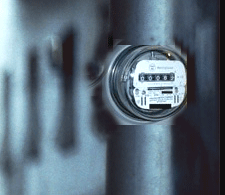 Several villages of Gori District request installing individual electric meters. People say that it is impossible to calculate their bills according to communal meters. The collectors use the advantage of the situation and make people pay more money than they use.
Several villages of Gori District request installing individual electric meters. People say that it is impossible to calculate their bills according to communal meters. The collectors use the advantage of the situation and make people pay more money than they use.
“People, these meters have already endured the frost let’s take them inside”, said Ioram, former head of the village of Kvakhvreli in the period of Soviet Union, when the electric meters were taken outside and hung on the light posts. People remember these words all the time when they start speaking about electricity meters.
Like harvest, which is left outside in the land, will be useless if it gets frozen electricity meters will also go wrong.
Today “frozen” soviet style electricity meters rob people of Georgian villages. No matter how much they tried to save the electricity they still have to pay 20 tetri for one kilowatt per hour.
When the meters were taken outside in the streets it was a good decision because electricity stealing rate decreased. The robbers of electricity were deprived of the opportunity to use energy through electricity meter. But now this method is out of date.
The inhabitants of the villages of Uplistsikhe and Kvakhvreli, Gori District applied to the Human Rights Centre for help, but nowadays in these villages the estimated electricity tariff is inappropriate. Every citizen of these villages must pay at least 20 tetri for one kilowatt per hour.
“It is good that we have electricity 24 hour a day but this fact becomes irrelevant when I have to spend the whole income of the family on electricity bill. During whole month I try to use electricity economically. I switch on only a TV-set and one bulb but the collector comes at the end of the month and tells us that we must pay 20 tetri for one kilowatt. The next month I try to spend less electricity but the collector comes and says that I have to pay 26 tetri for one kilo watt. I can not make out what kind of system is this?” asked Varvara Berikashvili.
The system is the following: A village is divided into districts. Approximately 45-60 families are switched in one communal meter. But every family also has its own soviet meter on a post without any protection box. Besides, there is one common meter in the village and the communal meters are attached to it.
“On the fifteenth of each month we check common meter, then communal meters. We write out the figures from them, sum up and match with the data of the common meter. Then we visit every family and check individual meters, write out figures and match to the communal meter. The figures never coincide. The total sum from individual meters is much less that communal meters show and the letter shows less than village meter. Thus we have to sum up the figures of all meters and consequently villagers pay the bill at increased tariff,” said Omar Tseruashvili, money-collector of the village.
We have been told at the Gori Branch of Power Distribution Company “Energo-Pro” that they are interested only in the figures from village meters. It is up to the population how they will divide the bills. Energo-Pro avoids responsibility for the collectors forcing people pay extra money. The absence of control enables collectors to act on their own will. An engineer of Energo-Pro turned off electricity in one of the villages deliberately.
The collector of the same village said that the reason for cutting off the electricity was unpaid bills. Human Rights Centre got in touch with the Energo-Pro Service Centre and found out that the village did not have any debts. It appeared that the collector and Merab Okruashvili, the engineer of Energo-Pro Service Centre turned off the electricity to force the population pay the bill, 25 tetri for one kilowatt that is much more than estimated price on electricity. People doubted the collector and the engineer were sharing extra money between them.
The population demands to install individual meters. Approximately 300 lari is required to install new meters. We were told in the Power Distribution Company that subscriber must buy a meter and a box at their own expense, they must prepare house plan (that costs 50 lari), buy special wire and the most important- hire a craftsman. This all requires a lot of money. So the families with low income prefer to pay 25-30 lari extra. Besides, nobody is sure that they will take the plan of the house without any problems.
Saba Tsitsikashvili,Gori
News
December 13, 2023
Ethnic minorities outside the peace dialogue
November 6, 2023
‘Peace’ agenda of political parties
Popular
Articles
February 13, 2024



